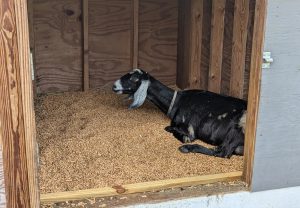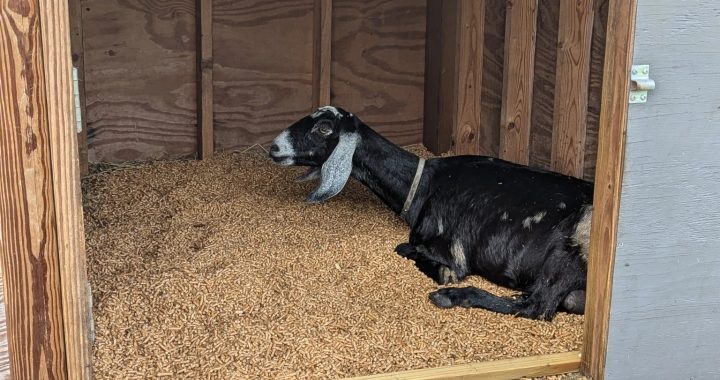
Important Goat Illness Information
Mini goats, like all livestock, can be susceptible to various illnesses.
Normal temperature for a goat is 101.5 to 103.5 degrees F. If a goat is registering a temperature above normal, chances are high that they have an infection. If a goat is registering a temperature below normal the goat is in very critical condition and needs immediate attention. Never feed a goat with a below normal temperature, the food will not digest properly and can cause severe complications – this goes for newborn and milk dependent kids as well.
Taking the temperature of a goat
Straddle the goat, if possible, so that you are looking at the hindquarters. Lift the tail and gently insert the thermometer under the tail partway into the rectum and hold it there for 3 minutes if using a glass thermometer – wait for the beep if using a standard digital thermometer. Remove thermometer and read the results. Normal is 101.5-103.5°F.
Goats, as herd animals, often hide signs of illness until it becomes more serious. By spending time with your goats daily you can get to know their individual behavior and what their ‘normal’ looks like, so it becomes much easier to pick up on subtle signs that your goat isn’t feeling well. Major signs of illness are going off-feed, lethargy, self-separation and teeth grinding.
Here are some of the most common illnesses in mini goats, along with prevention and treatment strategies:
- Scours (Goat Diarrhea)
- Symptoms: Clumpy to watery or loose stools, dehydration, lethargy, loss of appetite, and soiling around the tail and hind legs.
- Prevention: Maintaining a clean living environment, providing a balanced diet, and avoiding sudden dietary changes. Vaccination with CD&T can also help reduce the fatality risk of scours.
- Treatment: Rehydration with electrolytes to combat fluid loss and addressing the root cause – overeating is a common (and surprisingly fatal) cause of scours, as is parasites such as coccidiosis. It’s good to keep Kaopectate/Pepto Bismal, as well as having Toltrazuril, Corid (Amprolium) or an appropriate sulfa medication on hand. Do not ignore scours, it should always be taken very seriously.
- Parasites (Internal and External)
- Symptoms: Diarrhea, weight loss, anemia (pale gums or eyelids), scratching, biting, or licking of skin, patchy hair loss.
- Prevention: Regular deworming, fecal tests, rotating pastures, and maintaining a clean living area.
- Treatment: Use appropriate dewormers and insecticidal treatments as recommended by a veterinarian.
- Caseous Lymphadenitis (CLA)
-
- Symptoms: Swollen and inflamed lymph nodes, fever, appetite loss, weight loss, thick yellowish-brown pus from lymph nodes.
- Prevention: Practice good hygiene, wash hands and tools, avoid contact with infected animals or materials, and consider vaccination.
- Treatment: Antibiotics such as ciprofloxacin, doxycycline, or tetracycline. Surgery may be needed to remove severely infected lymph nodes.
- Caprine Arthritis Encephalitis (CAE)
-
- Symptoms: Arthritis or joint swelling, neurological symptoms (depression, nervousness, seizures), respiratory illness (coughing, nasal discharge).
- Prevention: Test new animals for the virus before introducing them to the herd, separate positive animals, and practice good sanitation.
- Treatment: No cure, but management and supportive care can help alleviate symptoms. Anti-inflammatory drugs and painkillers can be used to manage pain and inflammation.
- Pneumonia
-
- Symptoms: Coughing, sneezing, nasal discharge, labored or rapid breathing, loss of appetite, fever.
- Prevention: Ensure proper ventilation, reduce stress, vaccinate against common respiratory pathogens, and keep sick animals away from the herd.
- Treatment: Early diagnosis and treatment with antibiotics are crucial for successful recovery.
- Foot Problems (Hoof Rot and Overgrown Hooves)
-
- Symptoms: Limping, refusal to walk, swollen or discolored hooves, foul-smelling discharge, cracked or split hooves.
- Prevention: Regular hoof trimming (every 6-8 weeks), providing clean and dry areas, and isolating affected goats.
- Treatment: Clean the hooves thoroughly, apply antiseptic or antifungal treatment, and consult a veterinarian for severe cases.
- Contagious Ecthyma (Orf Disease)
-
- Symptoms: Blisters and scabs around the mouth, nostrils, and sometimes the feet.
- Prevention: Avoid contact with infected animals, practice good hygiene, and consider vaccination.
- Treatment: Supportive care and topical treatments to manage symptoms.
By being aware of these common illnesses and taking preventive measures, you can help ensure the health and well-being of your mini goats. Regular veterinary check-ups and maintaining a clean and safe environment are key to preventing and managing these health issues.

